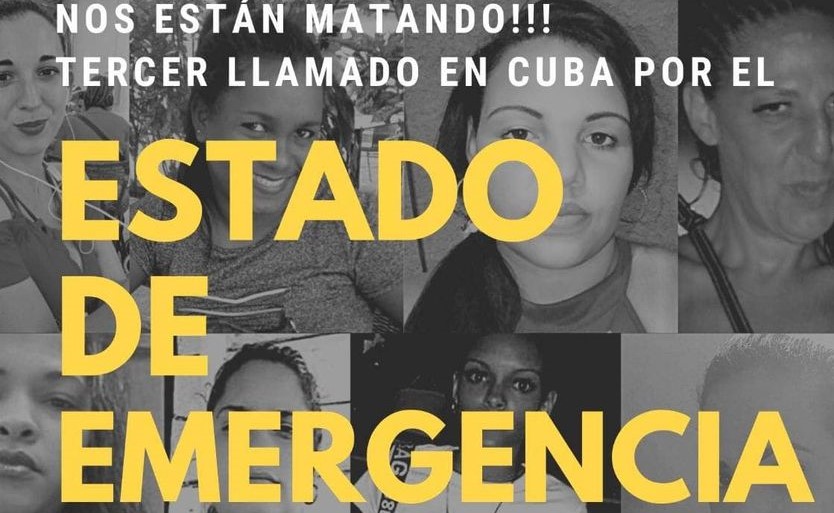Several Cuban civil society organizations demanded that the regime declare a state of emergency in the country given the spike in gender violence, which in recent days has claimed the lives of at least three women, including a 17-year-old.
In a letter published on the Facebook page of the platform Yo Sí Te Creo in Cuba, in which they again call for the approval of a law against gender violence, the organizations recalled that in 2021 and 2022 they made two appeals "seeking, without success, for the Cuban State to declare a state of emergency for gender violence, at a time when numerous acts of extreme violence have been reported in a short space of time."
"Today we are in another situation that would also merit declaring a state of emergency, a mechanism that consists of establishing measures to prevent and eradicate behaviors that promote gender violence, along with protection protocols for survivors," says the text, signed by Yo Sí Te Creo en Cuba, the magazine Alas Tensas, the Cuban Alliance for Inclusion, Casa Palanca, the Citizen Committee for Racial Integration, Cubalex and Justicia 11J, among other projects.
The letter noted that, in less than a week, three femicides were recorded in Cuba. Two of the murdered women had previously been reported missing. The third, a 17-year-old teenager, was murdered by her ex-partner, a 50-year-old man.
This femicide took place at a police station, where the young woman entered seeking protection against the aggressor. Civil society organizations observed on Facebook that this man had "a history of gender violence," an observation echoed by a neighbor who offered his testimony, on condition of anonymity, to the activist Alpidio Leyva, after the incident.
"Just this police station, located in Camalote, a town belonging to the Nuevitas municipality, detained eight people during the mass protests of 2022 due to the blackouts, among them a 17-year-old minor and his mother, after they filed a complaint there. This illustrates the priorities of the police system," states the letter published on Facebook, about the police station where the teenager was killed.
In 2021, DIARIO DE CUBA analyzed the disparity between the tepid responses by the Cuban regime's prosecutors and police in dealing with assailants of women and the severity of the measures taken against dissenters, dissidents and peaceful demonstrators.
"In addition to the events so far in 2023, there were two disappearances, also of two girls, who were, fortunately, found alive, and three other femicides. In one of them, the aggressor, a policeman, used his service weapon," the text says.
"We can add that we have four unconfirmed feminicide alerts in Matanzas, Florida (Camagüey), Alamar and San Agustín (Havana), this being hampered by the lack of transparency in this regard, and the absence of official figures," he adds.
The letter clearly holds the Cuban state responsible for the murders of women in a country that lacks effective prevention mechanisms.
"They're killing us because we lack effective prevention protocols and mechanisms in Cuba, because we do not have access to justice: problems persist in the enforcement of restraining orders and the processing of complaints," the letter stresses.
In addition to the aforementioned shortcomings, the organizations criticize that state programs such as the Advancement of Women "remain only on paper," "the promised Gender Violence Observatory has not yet arrived, and the 103 Hotline was not even active for a year."
"Many of the aggressors identified had a history of violence, which reveals the absence of prevention and strategies for the reintegration of these people," the letter complains, also criticizing the lack of shelters for women victims of abuse and their children, and the criminalization of feminist activists, and all activists, by the State.
The letter points out that it is the State that has the resources to decree the state of emergency and calls for citizens to organize in order to "prevent femicides and disappearances."
The projects recall that three Cuban women faced repressive action for requesting permission to hold a peaceful demonstration on March 8, using the established channels, and demanded respect for "the right to protest and peaceful demonstration of activists and women who are using the hashtag #LaCalleSeráTestigo" (The Streets Will Bear Witness).
"We continue to call for a #LeyIntegralContraLaViolenciaDeGénero (Comprehensive Gender Violence Law) in Cuba, and for the criminalization of feminist activism to cease once and for all," concludes the text, also signed by the projects Las Afueras, Les Apostates, Mujeres Democristianas Cubanas, the Alas Tensas Gender Observatory, the Plataforma de Apoyo a Personas en Situación de Violencia de Género (Platform Supporting Persons Facing Gender Violence), the Red de Lideresas y Líderes Comunitarios (Community Leaders Network), the Red Femenina de Cuba (Women’s Network of Cuba) and the magazine Afrocubanas.
